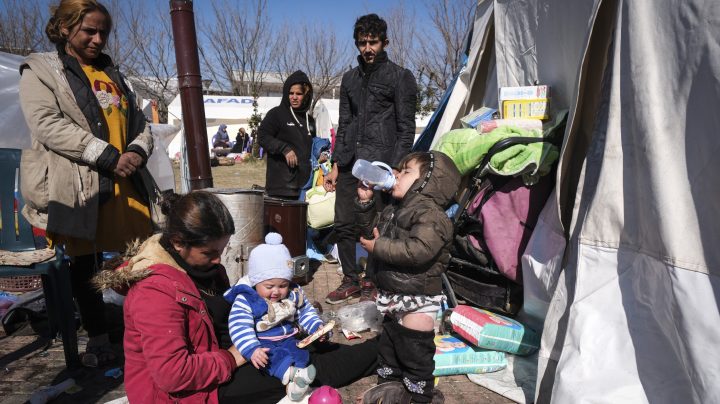
It’s hard to send earthquake relief remittances to Syria

The death toll from last week’s 7.8 magnitude earthquake in Turkey and Syria now tops 37,000 people, with tens of thousands more reported injured.
Since the earthquake, there’s been a rush to send cash by way of money transfers, known as remittances, from abroad. But getting money from the United States to war-torn Syria, which has been under U.S. sanctions for years, has been complicated.
Dania Hallak, who was born and raised in Syria and now lives in the U.S, said that sending money to relatives back home took days even before last week.
“Now with an earthquake, there’s no idea or way for us to know how that money could be sent,” she said. “It feels very debilitating.”
But it’s another story for a family member of Hallak’s living in Turkey, she said. “The area around her was supported, and she was able to receive aid.”
The difference is Syria is under U.S. sanctions for supporting terrorism and human rights abuses during the nation’s civil war.
Today, most major money transfer companies won’t remit cash from the U.S. to Syria, even though they’re a lifeline, especially after disasters, said Caroline Theoharides, associate professor of economics at Amherst College.
“Remittances can go directly into the hands of the households,” she said. “The households are able to spend it immediately on what’s necessary, whether that’s medicine, a new roof or clothes for their kids — whatever the case may be.”
The U.S. Treasury Department has issued what’s known as a general license, which a spokesperson said temporarily ”authorizes all transactions related to earthquake relief efforts in Syria that would otherwise be prohibited” by sanctions.
Susan Pozo, an economics professor at Western Michigan University, said there’s a message there:
“Yes, there are sanctions, but this is something different. The funds are going for a real humanitarian need,” she said.
She added that the Treasury Department’s move could also reassure money transfer companies worried about running afoul of U.S. sanctions.
Even days later, Western Union, Ria and MoneyGram still don’t allow transfers from the U.S. to Syria on their websites. Consequently, people trying to send money there may end up relying on social networks and family connections, said Ina Ganguli, associate professor of economics at the University of Massachusetts Amherst.
“Those channels already existed, so hopefully those can be leveraged,” Ganguli said.
There’s a lot happening in the world. Through it all, Marketplace is here for you.
You rely on Marketplace to break down the world’s events and tell you how it affects you in a fact-based, approachable way. We rely on your financial support to keep making that possible.
Your donation today powers the independent journalism that you rely on. For just $5/month, you can help sustain Marketplace so we can keep reporting on the things that matter to you.











